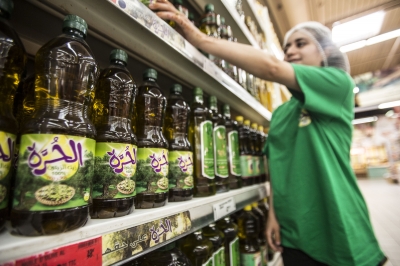Improving olive oil quality, from field to shelf

Gaining a foothold in a crowded global olive oil market involves improving quality standards and productivity – from field to shelf – and better marketing. Over the last several years, FAO and the EBRD have been supporting the olive oil industries in Jordan, Morocco, Tunisia and the West Bank and Gaza Strip to do just that. The European Union provided funding for the initiatives in Jordan, Morocco and Tunisia.
Activities ranging from trainings on best agronomic practices, market analysis and export development to policy dialogue, international study tours and olive oil tastings are helping the countries improve sector efficiency and raise the profile of their olive oils at home and abroad. This work is set to get a boost thanks to a new agreement signed between FAO and the International Olive Council in 2021, formalizing their cooperation.
In Morocco, with its good growing conditions and local olive varieties like the Picholine marocaine, attention has turned to improving quality, labelling and traceability systems. FAO and the EBRD have supported Interprolive, the country’s inter-professional olive federation, on policy dialogues as well as trainings on olive pruning techniques and agronomic practices for healthier trees and increased productivity. Efforts are also being made to raise consumer awareness on buying better quality Moroccan olive oil that is packaged, sealed and labelled.
In Tunisia, FAO and the EBRD supported olive oil industry stakeholders to map out a common vision, strategy and action plan – crucial for building public-private consensus on everything from raising quality standards to accessing new markets. Tunisia has good potential to tap into international olive oil markets with bottled, value-added and organic extra virgin olive oils. The country is already one of the top global exporters of olive oil, but most of its oil has been sold in bulk. In a first for Tunisia, SME exporters are being supported to achieve the highest-level of food safety certifications, using food quality and safety standards to promote higher value-added exports and open new markets.
FAO and the EBRD have carried out comprehensive reviews of the respective olive oil sectors in Jordan and the West Bank and Gaza Strip to identify constraints and opportunities. The analysis pinpoints gaps in know-how and financing and the environmental impacts of olive oil production. This will inform the types of public and private investments and training needed to improve sector performance and sustainability.
